| SHADOWS ON THE WALL | REVIEWS | NEWS | FESTIVAL | AWARDS | Q&A | ABOUT | TALKBACK | |||||
 Shadows off the beaten path Shadows off the beaten pathIndies, foreign, docs and shorts...
On this page:
BLOOD-RED OX |
ROCK. PAPER. GRENADE. |
RODEO
| |||||
| See also: SHADOWS FILM FESTIVAL | Last update 11.Nov.22 | |||||
|
Blood-Red Ox Review by Rich Cline | 
| |||||
 dir Rodrigo Bellott scr Nate Atkins, Rodrigo Bellott prd Kaolin Bass, Rodrigo Bellott, Andrea Camponovo, Rodrigo A Orozco with Mazin Akar, Kaolin Bass, Andrea Camponovo, Vitorio Lema, Idalmis Garcia Rodriguez, Julian Mercado, Miguel Michel, Ana Dominguez, Toto Vaca, Shawn Brown, Mary Ellen Liepins, Marco Antonio Mercado release US 11.Nov.22 21/Bolivia 1h34 Now streaming... |
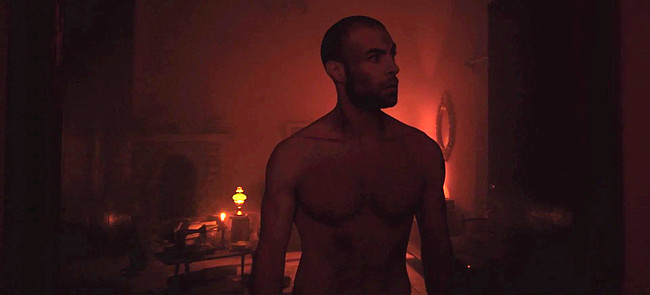 Shot in glorious locations, this unusually earthy horror film is grounded in witty interaction and offbeat traditions. Director Rodrigo Bellott also occasionally drenches the screen in red, evoking freaky underlying mythology while depicting an unnerving collapse in mental health. Events develop in an often surreal way, continually flipping reality to keep the audience on its toes. So while it's relentlessly inventive, it's difficult to properly engage emotionally. Travelling from Upstate New York to rural Bolivia with his boyfriend Amat (Kass), journalist Amir (Akar) reunites with his old friend Amancaya (Camopnovo) at her beautiful country house. But as they arrive, Amat begins having terrifying dreams. Meanwhile, Amancaya's brother Amaru (Lema) introduces them to local culture, including potent firewater and eerie legends. As they explore the area, Amat feels like he's haunted by a crimson ox, and that his grip on reality is slipping. Then Amir also starts having horrific dreams that make him doubt his own identity, and pretty much everything else. It turns out that Amat's dreams aren't new; he had them as a child, and feels that they've now returned because his insecurities are making him afraid of losing Amir. Bellott keeps the narrative flickering around in time, with clever shifts between New York's snow and Bolivia's sand. This highlights Amat's crippling jealousy, and adds a kick to his freakishly gruesome visions. While this is often disorienting, this approach also has a moving point to make about the echoing repercussions of an unstable mental condition. In a seriously demanding role, Bass spends much of the film in a state of mental anguish, often nakedly so. Amat's odyssey feels very messy, spiralling into a Lynchian fever dream, so his more grounded moments have a bracing authenticity. As the more reactive Amir, Akar brings a strong emotionality as a man grappling with setbacks in his efforts to make things better. Both actors have superb presence on-screen. The connection between them is strongly felt, even as events begin to feel somewhat melodramatic. Larger political and environmental issues swirl through the narrative, as Amaru works for a foundation dedicated to sustaining the area's "water factory", a dense forest in the hills. He thinks a recent fire was started by foreigners who have no regard for local plant and animal life. These important ideas add surprising textures to the film. The trickier thing is for the audience to piece the dream-within-dream storyline together in a way that connects with our experience.
| ||||
|
Rock. Paper. Grenade. Review by Rich Cline |  MUST
MUST  SEE SEE
| |||||
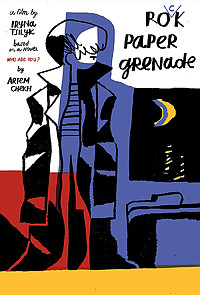 dir Iryna Tsilyk scr Iryna Tsilyk, Artem Chekh prd Vladimir Yatsenko, Anna Sobolevska with Vladyslav Baliuk, Yuriy Izdryk, Andriy Cherednyk, Anastasia Karpenko, Halyna Veretelnyk-Stephanova, Andriy Isaenko, Olexandra Semenko, Andriy Maksymov, Volodymyr Gladky, Anatoliy Yashchenko, Olha Shurova, Pavlo Kolobyuk release Ukr Oct.22 kcw 22/Ukraine 1h32  Is it streaming? |
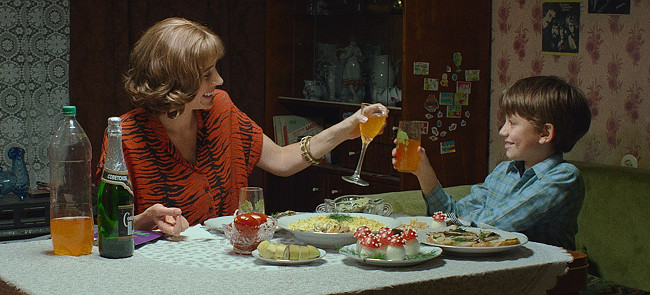 A strong visual style is infused with blasts of musicality in this period drama from Ukraine, based on an autobiographical novel by Artem Chekh, filmmaker Iryna Tsilyk's husband. Skilfully designed, directed and edited, the film is delicately infused with a blackly comical tone as it traces a boy's coming of age. It's a wonderfully understated film that gets under the skin while avoiding the usual tricks of the genre. In the 1990s, Olya (Karpenko) is a bit startled when her mother Lida (Veretelnyk-Stephanova) brings Felix (Izdryk) home to visit, claiming that he's a count who served in Afghanistan. His stories and quirky personality catch the interest of Olya's curious young son Tima (Cherednyk then Baliuk). But Olya is annoyed that Felix has actually moved in permanently. Felix suffers from post-traumatic stress and finds relief in classical music. He also befriends Tima, whom he calls "sergeant", and over the years becomes a key figure more like a father than his actual deadbeat dad Oleksiy (Isaenko). Shot in superbly visual sets and locations, the film's narrative unfolds in understated anecdotal scenes that feel bracingly true to life. Along the way, Tima has a sweetly budding romance with Toma (Semenko), who teases him that he thinks about little aside from smooching. Felix disappears from the story for long periods, even as his presence is strongly felt. Then in key moments his fiery spirit reappears unexpectedly, forcing Tima to see the world through more complex, grown-up eyes. The actors quietly lean into their characters' idiosyncrasies. Izdryk has terrific presence as the amusingly sardonic Felix, often seeming to be on some sort of secret mission. He's also usually drunk, tormented by his military past. His connection with Baliuk's teen Tima has a loose authenticity that skilfully sidesteps the standard cinematic cliches. Scenes between Baliuk and Semenko also have an unusual awkward honesty to them that's knowing and engaging. And Karpenko and Veretelnyk-Stephanova bring very different kind of maternal influences to their scenes. While this film was shot before the current war in Ukraine, its observational approach becomes sometimes startlingly resonant, using warm humour to gently explore the generational impact of war and conflict. This is depicted almost obliquely in scenes captured from inventive perspectives, snapping into focus in heart-stopping ways, such as when, after running off to serve in the military himself, Tima (now Gladky) returns to find his home has profoundly changed. Tsilyk weaves these elements together with a sure hand, finding powerful underlying themes without overstating anything.
| ||||
|
Rodéo Review by Rich Cline | 
| |||||
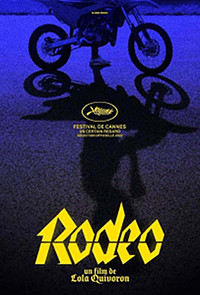 dir-scr Lola Quivoron prd Charles Gillibert with Julie Ledru, Yannis Lafki, Antonia Buresi, Louis Sotton, Junior Correia, Sebastien Schroeder, Cody Schroeder, Dave Nsaman, Ahmed Hamdi, Mustapha Dianka, Mohamed Bettahar, Chris Makodi release Fr 7.Sep.22, UK Oct.22 lff, US Oct.22 hiff 22/France 1h45 CANNES FILM FEST  Is it streaming? |
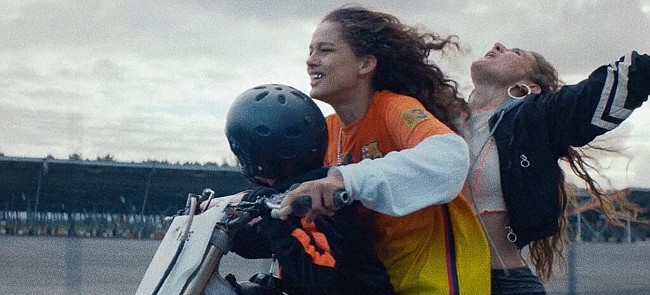 Diving headlong into a subculture, this French drama spirals around a young woman who is obsessed with riding off-road motorbikes in street gangs. There's little context to characters or situations, and the plot feels rather over-familiar as it develops a series of moral conundrums. But writer-director Lola Quivoron blasts energy through each scene, which makes the film feel urgent and involving. And biker-turned-actress Julie Ledru has terrific screen presence. Perpetually in trouble, Julia (Ledru) has lost her bike and has been thrown out of her mother's flat. Skilled at stealing motorbikes, she heads to the isolated spot outside town where riders revel in whizzy stunts, bristling with machismo that sidelines her. But she worms her way into a club overseen by Domino (Schroeder) from prison, and member Kais (Lafki) takes her under his wing. Soon she's impressing the boss with her bike-snatching prowess and befriending his wife Ophelie (Buresi). But gang member Ben (Sotton) has his doubts, and Manel (Correia) doesn't trust her. Opening in the middle of a full-on scene, the film is shot largely in close-up, never stepping back to establish the characters, which makes it difficult to keep track of who's whom or why they do what they do. This leaves their motivations feeling rather inaccessible, so it's hard to sympathise with all of these strong-willed people. The script also avoids taking a complex route, making it fairly clear where things are heading and who's good or bad. And in these kinds of movies, happy endings are extremely elusive. While Julia is too impulsively hot-headed to be likeable, Ledru finds enough internal grit to make her compelling to watch. We can see that she thinks deeply about everything, even though her decision-making skills are seriously appalling. Ledru also brings out her fiery soul in some powerfully intense moments. Other characters are similarly underwritten, but benefit from high-energy actors, with Buresi standing out as the entrapped Ophelie, whose out-of-control cheeky son Kulian (Schroeder) only calms down when he's around Julia. Because most of the cast is non-professional, including Ledru, the biker community has an earthy, electrically charged feel to it. And the premise is bursting with possibilities and ideas. So it's odd that the film's plot feels somewhat forced as it pits a woman against this man's world, complete with a climactic Fast & Furious-style heist set-piece. Still, the way Quivoron gets into this subculture is impressive, and the film is shot and edited in a way that makes us hold on for dear life.
| ||||

See also: SHADOWS FILM FESTIVAL © 2022 by Rich Cline, Shadows
on the Wall
HOME | REVIEWS | NEWS | FESTIVAL | AWARDS
| Q&A | ABOUT | TALKBACK | | ||||
